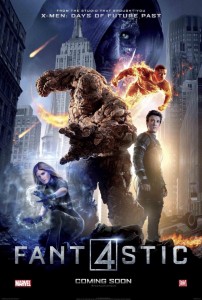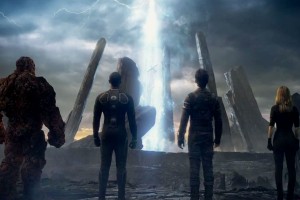Fantastic Four
Reviewed by Tony Keen 08-Sep-15
Fantastic Four is not as bad as you’ve been told, but boy, is it ever dull.
 I have a slight confession with which to begin this piece. I’m okay with the 2005 Fantastic Four movie. I mean, it’s not a brilliant piece of work, but it’s not horrible. And at least there’s a sense that someone involved might once have read a Jack Kirby FF comic.
I have a slight confession with which to begin this piece. I’m okay with the 2005 Fantastic Four movie. I mean, it’s not a brilliant piece of work, but it’s not horrible. And at least there’s a sense that someone involved might once have read a Jack Kirby FF comic.
Ten years later, there is little similar sense from 2015’s Fantastic Four, or Fant4stic as it is somewhat pretentiously styled. What the creators of this reboot clearly have read is Brian Michael Bendis and Mark Millar’s Ultimate Fantastic Four from 2004, perhaps not surprising given that Millar acted as a consultant on this movie, and on the face of it sensible, given how much of the successful Marvel Cinematic Universe draws on Millar’s Ultimates. Indeed, what we get here is essentially a reworked version of the origin story from Ultimate Fantastic Four, combined with a number of set pieces drawn from other (better) superhero movies, and all of this scripted by people who rather lack the writing ability of Bendis or Millar (let alone Stan Lee or Kirby).
There are some things that this movie does do better than its predecessor. The casting of Michael B. Jordan as Johnny Storm is interesting, if evidently infuriating to people who like to think they’re not really racists, but want to preserve the “traditions” of Marvel. One could certainly make a case that the CGI Thing seen here is better than Michael Chiklis’ rubber suit. But the Hollywood process has crushed the heart out of this movie. Five people had a go at the screenplay, of which only three, Jeremy Slater, who took the second go at it, and director Josh Trank and producer Simon Kinberg, who completed the final version, have seen enough material survive in the final cut to get a credit. (The others were Michael Green and Seth Grahame-Smith.) That, of course, is the Hollywood way, but it does often mitigate against genuinely good work. To make matters worse, it appears that studio executives got involved at a late stage, and re-edited the movie. Director Trank is reportedly very unhappy about this. He might have some grounds, as the trailer suggested that this movie might have delivered on its promise rather more than it finally does.
But the probelms with this movie cannot all be laid at the door of the final edit. Some of them are deeply structural. Following the Bendis/Millar template means having their young versions of the FF, rather than the more mature characters Kirby and Lee originally created. That might have been refreshing for Ultimate Fantastic Four, but it brings a few problems of its own. Grown-up Ben Grimm, for instance, as an ex-USAF* and NASA pilot, has a reason to be associated with Reed Richards’ government-funded scientific project. But teen Ben Grimm can’t possibly have that experience, and his presence when things go wrong and the FF get their powers can only be justified by his being Reed’s best friend, and neither here, nor indeed, in Ultimate Fantastic Four, is that done in a truly convincing way. (Also, an older Ben Grimm would mean that the audience would not need to suspend its disbelief to the degree of accepting that Jamie Bell can pass for eighteen. He really, really can’t.)
There is a further problem, in that the FF’s origin as set out in 1961 has always been fundamentally implausible. So eager is Reed Richards to get his rocket into space that he steals it rather than waiting for official clearance. Marv Wolfman was already having problems with this back in the 1970s when he wrote the prose novel Doomsday, and it hasn’t got any more convincing in the interim. Unfortunately, most attempts to address the issue end up bringing in new implausibilities. So, in this movie, Reed and his three friends are able to steal and operate a dimension-crossing capsule which previously has needed a whole support team to get it to work. (And was I the only person in the cinema to be uncomfortable with the idea that an organic matter test of the system mean sending a chimpanzee? Aren’t we beyond that level of animal experimentation?)
Oh, and it’s not the four you might expect that make this journey. Another inheritance from Ultimate Fantastic Four is the desire to crowbar Victor von Doom into the FF’s origins, so the four that go are Reed, Ben, Johnny and Victor. Sue Storm is relegated to a bystander role, in the movie’s worst contrivance. There’s no particular reason why Sue misses out on the trip to the Negative Zone, or “Planet Zero” as it is called here, other than that the screenwriters conceived of a pod with four seats. It could perfectly well have had five – the writers just came up with an idea that reduced Sue to a secondary role.
There’s also a love triangle set up between Victor, Reed and Sue (in which Sue’s views, as so often in a Hollywood love triangle, aren’t really treated as important) – but this falls flat because there’s barely any chemistry between Miles Teller’s Reed and Kate Mara’s Sue, and in the movie we have there’s hardly any suggestion of an actual relationship. This again is in part a result of having young Reed rather than mature Reed. As an experienced and recognised scientist, one can believe that Reed might win the heart of an attractive younger woman looking as much for a father figure as for a lover. For high school graduate Reed, on the other hand, a woman like Sue is way out of his league.
I read an online article (which I now can’t find) that argued that the reason why FF movies don’t work is that they never properly address how much of a dick Reed Richards is, and why nonetheless Sue, Ben and Johnny still rally round him. I’m not sure that’s entirely fair to Reed, who seems to me as much motivated by guilt for dick moves in his past as by being a dick at any one moment. But Miles Teller’s Reed certainly comes across as being a dick. The strange thing is that the movie doesn’t seem to realise this. Instead it takes for granted that the audience likes Reed, without ever showing them any particular reason to do so. Nor does the flashback – lifted straight from Ultimate FF – to Reed and Ben’s youth (because who doesn’t like kids in a movie, eh?) help, largely because pre-teen Reed is just as much of a dick as his adult self.
By the end of the movie, Reed is moving into the role of leader, for reasons. In Lee and Kirby’s comic, Reed has always been the leader, from before they got their powers, because of his seniority over everyone else, in terms of age and career success. Again, a problem with young Reed is that there’s no convincing evidence presented for why he should be leader – indeed, the most mature and responsible character in the movie is Sue. That would have been an interesting update for the FF, but the received “wisdom” of Hollywood is that having a woman in charge of a superhero group is tantamount to making a chick flick, and so the movie backs away from this.
In the end, the biggest problem with Fantastic Four is not that it’s bad. It is bad, though perhaps not quite as bad as its 9% rating on Rotten Tomatoes suggests. And the effects frankly look no more sophisticated than those of a decade ago. But the worst thing wrong with this movie is that it is dreadfully dull. It takes ages for anything to happen, and when something does, it’s not very impressive. The alien landscape pales next to that seen in Thor: The Dark World, and the end recycles moments seen in the likes of Avengers: Age of Ultron. In a world where we have the Marvel Cinematic Universe, Christopher Nolan’s Batman movies, and even Fox’s X-Men franchise, for a superhero movie to be this unambitious and boring really isn’t good enough.
It’s easy to understand why some superhero franchises don’t make good movies. For all that the Hulk is held in a great deal of affection by many readers, many of the stories about him have been quite dull; it takes a lot of imagination to make a Hulk story work, and that much imagination hasn’t really been on display in the two recent movies. In forty years there’s barely been a single decent Ghost Rider story, so it’s hardly a surprise the two Nicolas Cage movies stank (it’s not just that they had Nicolas Cage in them). But there’s a long tradition of good FF comics, from Lee and Kirby, and later luminaries such as John Byrne. Why then doesn’t the FF seem to work on screen?
In a sensible world, the failure of this movie would lead to the sort of deal Sony came to after the “failure” of Amazing Spider-Man 2 (which, let’s be clear, is a much better movie than this one), that would allow the FF to be integrated into the MCU. What’s more likely is that Fox will try to relaunch this franchise by overtly tying it in to the successful X-Men franchise (which it already is or isn’t, depending on who you talk to). But whatever is done, any new FF movie must face that question – why does a series that works so well in comics not work on screen?
* Or ex-US Marine Corps. Take your pick – Marvel does.
Tags: 20th Century Fox, Fantastic Four, Jeremy Slater, Josh Trank, Marvel, Simon Kinberg